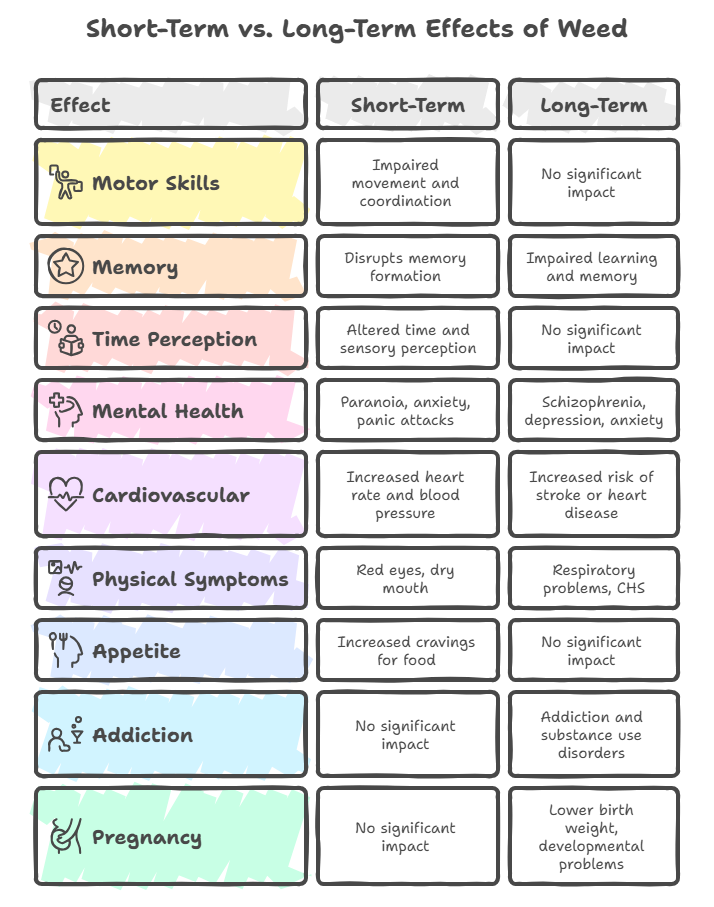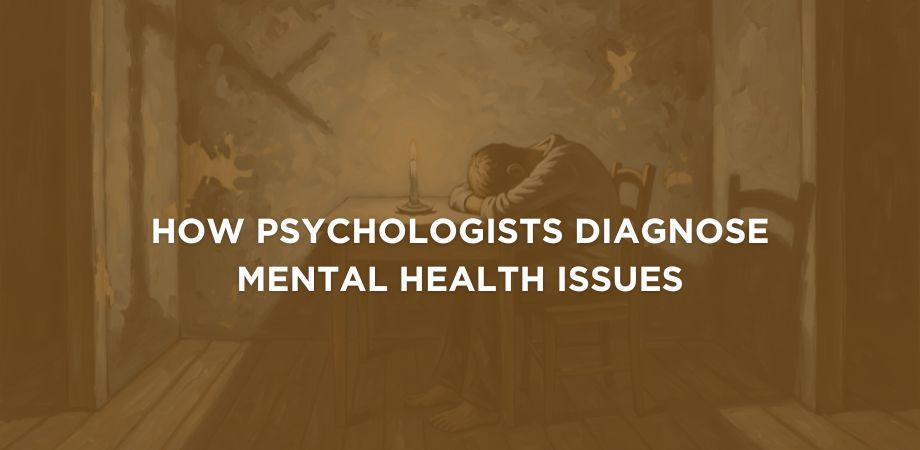Weed, also called marijuana, or ganja/pot locally, is a mind-altering hallucinogen that is derived from the Cannabis plant. Since ancient times, it has been used by humans for recreational and medicinal purposes. However, in today’s modern society, it has become a very common fixture and has impacted the lives of different people. In fact, approximately 147 million people use it for its effects and lower price compared to other drugs. In India, about 2.83% of the population is a consumer of weed, with 0.66% to 0.25% of individuals being dependent on it.
Weed affects the body in different ways. It can provide relief, but it can also have a major impact on your physiological and mental health. Weed contains two chemical compounds: tetrahydrocannabinol (THC), the primary psychoactive component, and cannabidiol (CBD). Most of the effects of ganja are short-term, but its long-term impact may show after repeated use, especially if used from an early age. Let’s dive into the details and learn about the impact of weed on the human body.
Short-term Effects of Weed
The effects of weed are felt immediately when it is smoked, as THC, along with other chemicals, passes through the body. Individuals experience a feeling of relaxation or euphoria as the drug passes from the lungs into the bloodstream and the brain. Feelings of anxiety, imbalance, mistrust, or general fear are common when individuals use weed.
Some short-term effects of weed include:
- Impaired Motor Skills: Weed impacts the cerebellum, cortex, and the basal ganglia, impacting body movement and coordination. This makes it unsafe to work or drive under the influence.
- Impaired Memory: Smoking weed or consuming marijuana disrupts the memory formation of the brain. This causes short-term memory loss, making it difficult to concentrate or focus.
- Altered sense of time: Users consuming weed have experienced altered time and sensory perception. Users also report seeing bright colors or hearing intense sounds.
- Feeling of Paranoia: Weed can be used for relaxation; however, high doses can cause anxiety, paranoia, intense panic attacks, or acute psychosis. Individuals with existing mental health disorders may suffer from feelings of sadness or distress.
- Cardiovascular Changes: Cannabis can increase the heart rate and raise the blood pressure immediately after use. This can be potent for individuals with existing heart conditions.
- Visual and Oral Symptoms: The classic sign of any form of addiction is red, bloodshot eyes, and it is the same after using weed. Users may also report dry mouth or xerostomia after using it.
- Increased Appetite: Some receptors in weed stimulate appetite, leading to increased cravings for food.

Long-Term Side Effects of Weed
Frequent or heavy use of weed has a lasting impact on the health of an individual. There is growing evidence that the use of marijuana has a profound impact on brain development, causing both mental and physical problems. This may include:
- Respiratory Problems: Weed contains toxins that increase the risk of chronic cough and chronic bronchitis. Users who are regular users may be susceptible to lung infections, which can cause issues like asthma or cystic fibrosis.
- Psychiatric Problems: The most concerning effects of the use of weed are related to mental health. As per a study, the use of cannabis led to the development of schizophrenia or severe mental illness among the surveyed individuals. Additionally, chronic use can lead to depression, anxiety, or suicidal thoughts.
- Brain Development and Cognitive Decline: The use of weed during adolescence, when the brain is developing, can lead to impaired learning, memory, and loss of control.
- Pregnancy-related Risks: Using weed during pregnancy may cause several pregnancy-related complications, like lower birth weight as well as long-term developmental problems in the offspring. In fact, prenatal exposure to cannabis increases the risk of ADHD in children. Additionally, a higher concentration of THC is associated with increased aggression among males.
- Addiction: Weed is an addictive substance, and users can easily become addicted to it. If the user starts from adolescence, then it increases the chances of compulsive misuse and the onset of addiction.
- Substance Use Disorders: The use of weed may coincide with substance addiction, increasing the risk of concurrent addiction.
- Cardiovascular Disease: Frequent use of marijuana can significantly increase the chances of stroke or heart disease. This may be caused by prolonged stress on the cardiovascular system due to repeated blood pressure and heart rate changes.
- Cannabinoid Hyperemesis Syndrome (CHS): It is a rare, but very serious condition seen in heavy users of weed. In CHS, users may suffer from a severe cycle of nausea, vomiting, or abdominal pain, requiring medical attention.
Impact of Weed on the Youth
The brain continues to develop until the mid-20s, and using cannabis during this period causes severe developmental issues. Weed is the third most illicit substance used by adolescents after alcohol and nicotine. This use impacts brain development and leads to the inappropriate activation of the reward pathway. Since the prefrontal cortex, which is responsible for impulse control and execution, is not mature, the use of weed impacts its development.
Heavy use of weed in teens leads to permanent loss of IQ points, which doesn’t even recover after stopping its use. All this can translate into poor school performance and lower occupational achievement in life.
Marijuana Addiction
Frequent and chronic use can lead to some individuals developing marijuana addiction or physical dependence on it. It can impair several areas of an individual’s life, and the individual may develop symptoms, such as
- Inability to quit, despite trying
- Having constant cravings for weed
- Consuming more of the substance than intended
- Giving up on social activities
- Requiring more substance to reach the same high
- Continuous use despite physical and physiological problems
- Experiencing withdrawal symptoms when intending to stop
- Unexpected financial troubles
- Legal troubles
- Failure to meet family and work obligations
Treatment for Weed/Marijuana Addiction
Recovery from marijuana addiction is a complex process, requiring the right support and treatment. There are no FDA-approved medications for treating marijuana addiction; however, there are numerous behavioral therapies that can help with the recovery. The treatment for addiction includes:
- Medical Detoxification: The process involves the safe withdrawal of weed from the body under the supervision of an expert team. At Alpha Healing Center, we have an expert team of doctors to help expedite the detoxification and recovery process for our clients.
- Medication: There are no FDA-approved medications to treat marijuana addiction. However, doctors may prescribe sleeping pills or mood stabilizers to tackle anxiety or sleeping problems.
- Cognitive Behavioral Therapy (CBT): It is a goal-oriented talk therapy that helps individuals identify the root cause of their addiction and change the negative pattern.
- Motivational Enhancement Therapy (MET): The counseling technique helps individuals resolve any uncertainties they have about quitting weed by helping them come up with their own ideas.
- Contingency Management (CM): It helps support positive behavioral change, like staying away from weed, by offering rewards. New rewards are unlocked when an individual completes a milestone.
- Multidimensional Family Therapy (MDFT): The therapy aims to resolve any conflicts or issues that are a cause of addiction.
Is Weed Legal?
Weed is legal for recreational use in some parts of the world, for example, Canada, Germany, Malta, and 24 US states. In many parts of the world, it is prohibited for use in medical use. However, the majority of countries have strict penalties, but some don’t decriminalize it, allowing for possession of small amounts.
The Narcotic Drugs and Psychotropic Substances (NDPS) Act of 1985 in India bans the possession and growing of weed. However, the act allows the use of cannabis leaves and seeds in some states. The possession of a small amount of weed can incur a fine of up to ₹10,000 or face a six-month prison sentence, or both.
Frequently Asked Questions
Scientists classify weed (THC) as a hallucinogen, but it is not strictly a hallucinogen like classic drugs like magic mushrooms or LSD. But when an individual smokes weed, the person experiences a high or hallucinatory-like effect.
Marijuana can cause short-term or long-term effects on an individual. Short-term effects may include impaired memory, motor skills, paranoia, and changes in the cardiovascular system. The long-term effects may cause respiratory problems, psychiatric issues, brain development issues, Cardiovascular disease, addiction, and so on.
Marijuana affects different people in numerous ways; while some report benefits, it mainly has negative effects. Also, there isn’t much research about the benefits of the substance as compared to the harm it causes.





